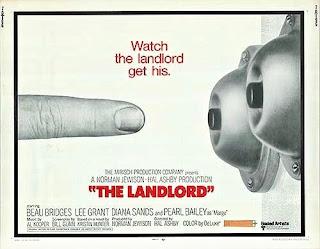
Having worked together on In the Heat of the Night, producer Norman Jewison (who directed Heat of the Night) and first-time director Hal Ashby (winner of an Academy Award for his work editing that 1967 film) once again tackled racial bigotry in 1970’s The Landlord, a comedy with plenty of heart that also delivered a very powerful message.
Elgar Enders (Beau Bridges) is a wealthy 29-year-old who, as the movie opens, is still living at home with his wealthy parents (Lee Grant and Walter Brooke). Deciding it’s time to strike out on his own, Elgar purchases an inner-city tenement house in Park Swope, Brooklyn, with the intention of evicting its black tenants and converting the building into a trendy new home.
His plans fall by the wayside, however, when Elgar gets to know his “renters” (who haven’t actually paid rent in months), including fortune teller Marge (Pearl Bailey), hair dresser Fanny (Diane Sands), Fanny’s revolutionary-minded husband Copee (Lou Gossett), and Professor Duboise (Melvin Stewart).
Elgar’s father chastises his son for not evicting the tenants, while his mother, Joyce, a self-professed “liberal”, panics when Elgar announces he’s fallen in love with black dancer Lanie (Marki Bey).
At times, The Landlord is a very funny film: when Elgar first drives up to his new home, he’s chased down the street - potted plant in hand - by Copee and a few others. Then, when he does finally walk into the tenement, Marge is there to greet him… with a shotgun!
Yet, despite this rough start, we eventually realize Elgar is much better off in his new surroundings than he was at home; Joyce proclaims time and again she believes in equality, only to change her tune whenever Elgar discusses his new life (when Elgar tells her about Lanie, Joyce - playing croquet at the time - stares at him as if in a state of shock, then tries to convince him he’s making a mistake).
Beau Bridges is excellent as the independently-minded Elgar, as are Lee Grant (as funny as she is tragic in the role of Elgar’s mom), Pearl Bailey (who steals every scene she’s in), Diane Sands (pulling off both sexy and sad, often in the same scene), and Lou Gossett (as the angry, mentally-disturbed Copee). Also good in supporting roles are Susan Anspach as Elgar’s hippie sister Susan, Robert Klein as Susan’s fiance Peter, and 10-year-old Doug Grant as Fanny and Copee’s son, Walter Gee.
Shining just as brightly as his cast is first-time director Hal Ashby; from the opening sequence (a quick montage of images, with Bridges occasionally breaking the fourth wall to address the audience directly) to the love scene between Elgar and Fanny (the entire set was tinted red, so that both appeared to be the same color), Ashby infused the film with enough style and creativity that you’d swear a seasoned pro was calling the shots. And while he certainly does a fine job with the film’s more comedic moments, it’s when things get serious (especially towards the end) that the "Ashby touch" takes full effect (a showdown between Elgar and Copee is as tense as they come).
Though undoubtedly a product of the era in which it was made (right down to the musical soundtrack), The Landlord, with its central theme of racial discord and love overcoming all, is as relevant today as it was in 1970. A time capsule that is also timeless, The Landlord is, 50+ years on, just as fresh as ever.
Rating: 9 out of 10
